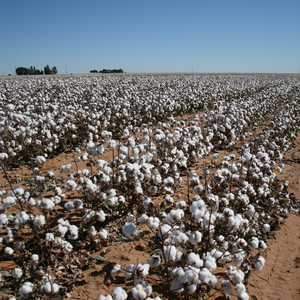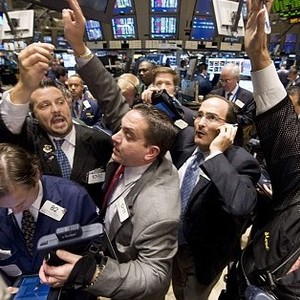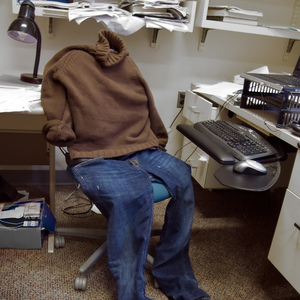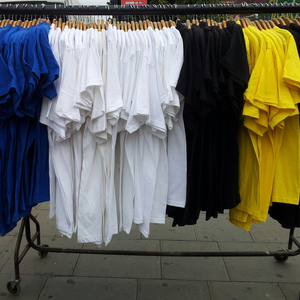Taxing imports makes imported goods more expensive for consumers. So why aren’t all seemingly similar items taxed the same? This audio story focuses on imported suits for Santa Claus impersonators. These red suits with white firm trim are worn by thousands of Santa Clauses around the Christmas holidays. Some of these outfits are taxed, others are not. Listen to learn more about the sometimes complicated laws that determine why not all Santa suits are taxed equally.
Continue reading “Not All Santa Suits Are Created Equal”Technology, Subsidies, and Cotton
Chances are, you’re wearing something made from cotton. You can check the label on most garments to find out where they were made. But where was the cotton grown that was the starting point? This story tracks down the source of the cotton that went into a T-shirt. A spinning mill in Indonesia is where the fabric may have been made, and the cotton fields of Mississippi is where the cotton may have been grown. But cotton is grown all over the world. Why would a textile mill in Indonesia buy cotton from the U.S. when they can get it from much closer? Listen to this story to find out how technology and subsidies give American cotton farmers an advantage in international trade.
Continue reading “Technology, Subsidies, and Cotton”Worker Shortage Not Always Solved by Incentives
Farming in California has become more difficult in recent years as there aren’t enough people to do the arduous work involved in farming. Incentives of higher pay don’t always work to attract enough workers. So the owner of one California farm has adjusted to this labor shortage in a few different ways and reached a conclusion about the cause of his problem and the best way to solve it. Listen to find out about the surprising decision he has made.
Continue reading “Worker Shortage Not Always Solved by Incentives”Incentives to Work Hard
In 1930, the economist John Maynard Keynes wrote an essay in which he predicted that by the time his children were grown up, people would be working just 15 hours a week. Today, in some countries, people do work a bit less than they did fifty years ago, but Keynes’s prediction was essentially wrong. There is a counter-intuitive response to incentives, and that is one factor that keeps people working long hours. According to his descendants, Keynes himself was a workhorse who couldn’t slow down. Listen to this audio story to learn more about Keynes and why making money doesn’t necessarily free us to work less.
Continue reading “Incentives to Work Hard”Organ Transplant Allocation
Many people need organ transplants, but there are not enough organs for all of them. Doctors have had to develop criteria for deciding who gets the organs that are available, knowing that those who don’t get the organs they need may die. Listen to hear how the allocation of available organs puts doctors in the position to make life or death decisions, and who keeps them honest about it.
Continue reading “Organ Transplant Allocation”What would you give up on the Internet?
Many Internet services are free: email, Internet search, and maps, for example. But what if you had to pay to use them? An economist sets out to discover how much people value various Internet services by asking how much they would need to be paid to give them up. It’s an example of a core economic principle: decision making. Listen to find out which Internet services people value most.
Continue reading “What would you give up on the Internet?”Decision Making and the Stock Market
Millions of people invest billions of dollars in the stock market to make their money grow. Some pool their money with other investors in high risk investment vehicles known as hedge funds. Hedge fund managers employ a variety of strategies with the goal of doing better than the stock market as a whole. The third richest person in the world, Warren Buffett, made a $1 million bet that he could beat the earnings of any hedge fund with his own investments in low-risk index funds. A hedge fund manager took him up on the challenge. Listen to the story to learn who is on his way to winning the bet and why.
Continue reading “Decision Making and the Stock Market”Improving the Absenteeism Rate at Work
Scarcity is a basic economic problem: people have unlimited wants and needs, but the world has limited resources. Resources in that equation include materials, capital, and labor. A pasta factory in southern Italy faced a very particular sort of labor shortage. The Barilla pasta factory in Foggia, Italy had enough employees to keep up with production schedules, but the employees weren’t showing up to work. The absentee rate among workers threatened the survival of the plant. Listen to the story to learn how bosses and managers changed employees’ attitudes and behavior and solved their scarcity issue.
Continue reading “Improving the Absenteeism Rate at Work”The Cheapest Place to Make a T-Shirt
Making a T-shirt takes a lot of time, but it can be made cheaply. The origins of your T-shirts probably come from Mississippi, where cotton is grown, and the shirts were probably spun in Indonesia. In this story, reporters track the assembly of a T-shirt to Bangladesh and try to understand why that Asian country is currently “the cheapest place in the world to make a T-shirt.” Bangladesh has established a specialization in garment production, and Bangladeshi garment factories further specialize in the production of cotton garments. Listen to the story to learn how these factories manage to undercut the prices of their competitors in other major garment producing countries and what the future may hold in store for them.
Continue reading “The Cheapest Place to Make a T-Shirt”The Price of a Hermes Bag
The luxury goods company Hermes makes and sells a high-end purse it calls the Birkin Bag. The Birkin costs $10,000—often more—and it is nearly impossible to find one to buy. Because very few bags are available, the Birkin has become a status symbol, something only very few people can buy. Its scarcity raises its value, which could explain why a purse can cost so much money. Listen to find out why a retail company, that by definition wants to sell things, makes it so difficult to buy their product.
Continue reading “The Price of a Hermes Bag”










